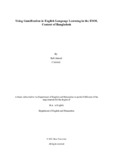| dc.contributor.advisor | Ahmed, Sabreena | |
| dc.contributor.author | Ahmed, Rafi | |
| dc.date.accessioned | 2021-11-28T04:53:45Z | |
| dc.date.available | 2021-11-28T04:53:45Z | |
| dc.date.copyright | 2021 | |
| dc.date.issued | 2021 | |
| dc.identifier.other | ID 17103002 | |
| dc.identifier.uri | http://hdl.handle.net/10361/15663 | |
| dc.description | This thesis is submitted in partial fulfillment of the requirements for the degree of Bachelor of Arts in English, 2021. | en_US |
| dc.description | Cataloged from PDF version of thesis. | |
| dc.description | Includes bibliographical references (pages 74-82). | |
| dc.description.abstract | Research suggests that in the case of language learning, developed countries are bringing technology-focused modern techniques. To date, there has been a limited study on bringing new and modern concepts on this aspect in an ESOL context like Bangladesh. Thus, the study aims to apply Gamification as a new concept in English language learning among students from Bangladesh. In addition, the current study explores how students of secondary level respond to Gamification, and what do they think about this technique and its problems. In order to collect data, I have adopted a qualitative multiple case study approach where six participants from higher secondary level of education were selected through purposive snowball technique. I taught the participants English vocabulary and grammar items through traditional lecture mode and Gamification such as Kahoot respectively, over two - days sessions. After the teaching sessions, participants’ semi-structured interviews were taken to find out their perception regarding both traditional and gamified way of learning English. Qualitative thematic analysis of the coded interviews revealed that the participants enjoyed the gamified way of learning vocabulary and grammar. They were highly motivated and encouraged towards learning. In addition, they felt that this new technique of learning was interesting, innovative, autonomous and different from the traditional mode of rote learning. The findings of the study will help English teachers to think of a new way of teaching English in a ESOL context such as Bangladesh. Moreover, it will encourage policy makers to add such techniques in mainstream classrooms. | en_US |
| dc.description.statementofresponsibility | Rafi Ahmed | |
| dc.format.extent | 126 pages | |
| dc.language.iso | en | en_US |
| dc.publisher | Brac University | en_US |
| dc.rights | Brac University theses are protected by copyright. They may be viewed from this source for any purpose, but reproduction or distribution in any format is prohibited without written permission. | |
| dc.subject | ESOL | en_US |
| dc.subject | English language learning | en_US |
| dc.subject | Gamification | en_US |
| dc.subject.lcsh | Education, Higher--Effect of technological innovations on | |
| dc.subject.lcsh | English language--Study and teaching--Foreign speakers | |
| dc.title | Using gamification in English language learning in the ESOL context of Bangladesh | en_US |
| dc.type | Thesis | en_US |
| dc.contributor.department | Department of English and Humanities, Brac University | |
| dc.description.degree | B.A. in English | |

